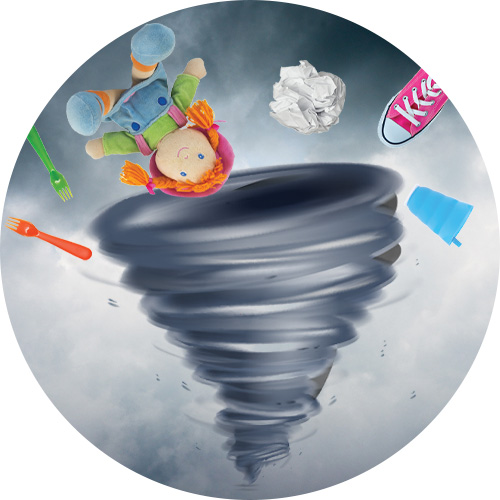I of the Storm: Chapter 3

The scrunched-face screaming was a constant, slowly skinning my sanity. I’d pace the hallway, saying “sh-sh” until my palate was dry and my hands were limp

“Leavin’ at two?” Angela warbled, chewing on a purple wad of gum. “Another holiday, a’ready?”
“Nope.” I frantically shut down Outlook and swept papers into my briefcase. “No holidays for a while. Just some play therapy for Shira.”
“You guys are sumtin’. If I had four of dem, I’d be in da loony bin.”
You’re not far off, I want to say.
Instead I chuckle and raise my palms, as if to say, What can you do? Some of us are just superwomen.
Yeah, right.
I gnash my teeth and propel my legs out the door. After seven intense hours, I never thought I’d actually want to stay at the office — I run the communications department of a software company — but the day had arrived.
At Alyssa’s recommendation, we’d started shared play therapy to improve my relationship with Shira. Daniel had his moments, but overall, he handled her behaviors with far more aplomb. Shira didn’t get under his skin, spawning an emotional hemorrhage the way she did to me — and I wanted to understand why.
Each session, we’d make a project, create a puppet show, or play on the keyboard. It was going okay — the therapist, Risa, seemed professional and intuitive, and Shira loved the one-on-one — but… I hated going. Worse, I hated myself for hating it.
What’s wrong with you? my inner critic tsk-tsked. She’s not fighting, she’s not kvetching, she’s not even destroying property. Why can’t you enjoy 45 minutes together?
Because this child doesn’t give me space, I retorted. I deal enough with her at home; now even my sacred “alone” time has been violated.
Several weeks in, Daniel and I attended a parent session.
“Ilana, you don’t look happy coming here,” Risa said. “You yawn a lot, you look disinterested. What’s up?”
“I am bored,” I admitted. “My work is fast-paced and stimulating. Pastel coloring with Shira on my lap — not so much.”
“Okay, I get that.” Risa furrowed her brows. “But I’m sensing there’s more. You look unsettled.”
I thought hard. Why did this room make me so uncomfortable?
“Maybe because it screams ‘failure,’ ” I said slowly. “I’m a type A personality. Classic overachiever. I have a demanding job and do it well. I’m not used to failing.”
My mind rolled back to Shira’s infanthood — a stage I preferred to forget. Born after a 36-hour complicated labor, she gave out a lusty cry… and didn’t stop for the next six months. I swaddled her, nursed her, burped her. I went off dairy, veggies, soy. Nothing. The scrunched-face screaming was a constant, slowly skinning my sanity. I’d pace the hallway, saying “sh-sh” until my palate was dry and my hands were limp. Then I’d throw her into Daniel’s arms and bury my head in the pillow.
This was not in the script. I was a success story — smart, popular, and attractive, the senior selected as AIPAC student representative and valedictorian. I was accepted to a top school in Israel, solicited for a coveted work position, offered an Ivy League scholarship, and suggested a surfeit of quality boys to date.
But Shira confounded me: She was the first problem I couldn’t solve. She shattered my self-image, splattered noxious imperfection in my face. Could it be, that I — stellar student, homemaker, and manager — was getting an F in this thing called motherhood?
When maternity leave ended, I practically ran back to work.
“Ain’t easy, leavin’ those babies,” Angela had said, offering a sympathetic pat.
Who said?
Risa drew me back into the present.
“You’ve achieved something major, just by articulating these thoughts,” she said, nodding encouragingly. “Awareness is half the battle.”
Gosh. I hadn’t realized I’d voiced this stuff aloud.
“But Ilana, any mother with a child like Shira would have a hard time. Can you try to disentangle yourself and accept that you didn’t create her challenges? That her explosions and intensity are no indication of your competence — or lack thereof?”
Risa fingered Shira’s last project: a meticulously sketched house — marred by jagged, vigorously applied red crayon. At the last minute, when Risa had mentioned that time was nearly up, Shira lost it, butchering her work of art.
Risa caught my eyes, offering a final query.
“Can you look at Shira with compassion, instead of indignation?”
(Originally featured in Family First, Issue 469)
Oops! We could not locate your form.


